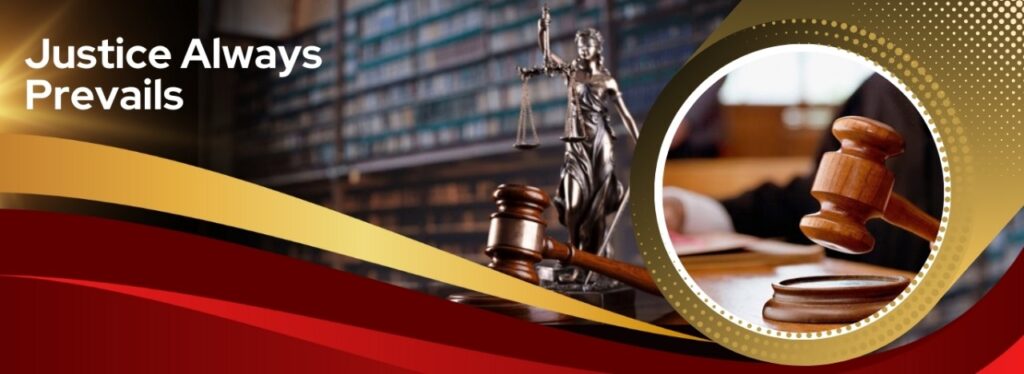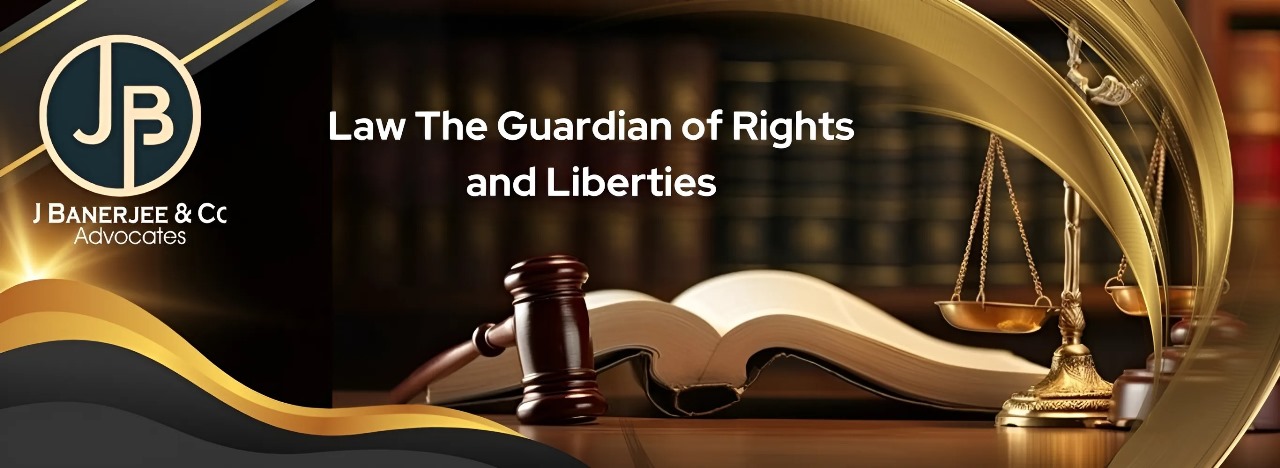Disclaimer
In accordance with the rules of the Bar Council of India, law firms are not permitted to solicit work or advertise. By clicking the "Agree" button and accessing this website (www.jbanerjee.co.in), you acknowledge that you are seeking information voluntarily and that no solicitation has occurred by the Firm or its members.
The information on this website is provided solely at your request for informational purposes only and should not be interpreted as solicitation or advertisement. The Firm is not liable for any consequences of actions taken by users relying on the material or information provided on this website. For any legal issues, you should seek independent legal advice.
-
16, Dr. Suresh Sarkar Road, Kolkata 700014
FAQs
Frequently Asked Questions
- Intellectual Property refers to creations of the mind, such as inventions, literary and artistic works, designs, symbols, names, and images used in commerce.
- If you are accused of a crime, it is important to remain silent and contact a criminal defense attorney immediately to protect your rights and build a defense.
- Remedies in civil cases may include monetary damages, injunctions, specific performance, or declaratory judgments, depending on the nature of the dispute.
- It is advisable to seek legal assistance as soon as possible when facing service-related issues to understand your rights, obligations, and options for resolution.
- Writs are formal written orders issued by a court directing a person or entity to take or refrain from taking a certain action.
- The process for obtaining a divorce typically involves filing a petition with the court, serving the petition on the other spouse, negotiating terms of the divorce, and attending court hearings if necessary.
- Employees facing service-related issues may seek legal remedies such as filing grievances, complaints with administrative bodies, or lawsuits for wrongful actions by employers.
- Civil cases can be resolved through negotiation, mediation, arbitration, or trial in court, depending on the preferences of the parties involved.
News & Blog Updates
Our Latest News

Admin
Navigating Legal Challenges in Startups
Date: May 20, 2024 Starting a new business is an exciting venture filled with opportunities and challenges. One of the critical aspects that can determine the success or failure of a startup is its legal foundation. At J Banerjee & Co Advocates, we understand the unique legal needs of startups and are here to guide you through the complexities. 1. Choosing the Right Business Structure The first step in starting a business is deciding on the right legal structure. Whether you opt for a sole proprietorship, partnership, limited liability company (LLC), or corporation, each comes with its own legal implications. Our experts can help you understand the pros and cons of each structure and assist you in making an informed decision that aligns with your business goals. 2. Intellectual Property Protection Protecting your intellectual property (IP) is crucial for maintaining a competitive edge. This includes trademarks, patents, copyrights, and trade secrets. We offer comprehensive IP services to help you secure your innovations and creations, ensuring that your startup's unique value propositions are safeguarded against infringement. 3. Compliance and Regulatory Issues Navigating regulatory requirements is often a daunting task for startups. From obtaining necessary licenses and permits to adhering to industry-specific regulations, our team provides guidance to ensure your startup remains compliant. We help you stay updated with changing laws and regulations, mitigating risks that could hinder your business operations. 4. Contract Drafting and Review Contracts are the backbone of business transactions. Whether it's a partnership agreement, employment contract, or vendor agreement, having clear and enforceable contracts is essential. Our legal experts specialize in drafting and reviewing contracts to protect your interests and prevent potential disputes. 5. Fundraising and Investment Securing funding is a critical milestone for any startup. We assist in structuring financing deals, preparing investment agreements, and ensuring compliance with securities laws. Our goal is to help you attract investors while protecting your startup's interests. Starting a business is a journey filled with legal intricacies. At J Banerjee & Co Advocates, we are committed to providing personalized legal support to help your startup thrive. Contact us today to learn how we can assist you in navigating the legal landscape.
Read More

Admin
The Importance of Estate Planning
Date: May 20, 2024 Estate planning is often overlooked, but it's a critical component of financial planning. At J Banerjee & Co Advocates, we believe that a well-thought-out estate plan ensures your assets are managed and distributed according to your wishes, providing peace of mind for you and your loved ones. 1. Understanding Estate Planning Estate planning involves creating a strategy for the management and distribution of your assets after your death. It encompasses various legal tools such as wills, trusts, powers of attorney, and healthcare directives. A comprehensive estate plan can minimize potential disputes among heirs and reduce the tax burden on your estate. 2. Drafting a Will A will is the cornerstone of any estate plan. It specifies how your assets should be distributed and who will care for any minor children. Without a will, the state will determine the distribution of your assets, which may not align with your wishes. Our legal experts can help you draft a clear and legally binding will to ensure your intentions are honored. 3. Setting Up Trusts Trusts offer greater flexibility and control over the distribution of your assets. They can be used to manage property, provide for minor children, and even support charitable causes. Trusts can also help reduce estate taxes and protect your assets from creditors. We can guide you through the different types of trusts and help you set up the ones that best meet your needs. 4. Powers of Attorney and Healthcare Directives Estate planning isn't just about what happens after you die; it's also about preparing for unexpected events during your lifetime. A power of attorney allows you to designate someone to manage your financial affairs if you become incapacitated. Similarly, a healthcare directive outlines your preferences for medical treatment if you're unable to communicate your wishes. 5. Regularly Updating Your Estate Plan Life is dynamic, and so are your estate planning needs. Major life events such as marriage, divorce, the birth of a child, or significant changes in your financial situation should prompt a review of your estate plan. We recommend reviewing and updating your estate plan every few years to ensure it remains aligned with your current circumstances and goals. Estate planning is a vital step in securing your legacy and providing for your loved ones. At J Banerjee & Co Advocates, we are dedicated to helping you navigate this complex process with ease. Contact us today to start planning for your future.
Read More

Admin
Understanding Employment Law: Key Considerations for Employers
Date: May 20, 2024 Employment law is a critical area that affects every business. Understanding and complying with employment laws not only helps avoid legal disputes but also fosters a positive work environment. At J Banerjee & Co Advocates, we offer expert guidance on employment law to help employers navigate their legal responsibilities effectively. 1. Employment Contracts A well-drafted employment contract is essential for defining the relationship between the employer and the employee. It should clearly outline the terms of employment, including job responsibilities, compensation, benefits, and termination conditions. Our legal team can assist you in creating comprehensive employment contracts that protect your interests and comply with legal requirements. 2. Workplace Policies and Procedures Establishing clear workplace policies and procedures is crucial for maintaining order and consistency in your business operations. These policies should cover areas such as attendance, performance expectations, harassment, discrimination, and disciplinary actions. We can help you develop and implement policies that promote a fair and productive work environment. 3. Compliance with Labor Laws Employers must comply with various labor laws at the federal, state, and local levels. This includes laws related to minimum wage, overtime pay, employee classification, workplace safety, and anti-discrimination. Our experts stay updated with the latest legal developments and can provide guidance to ensure your business remains compliant. 4. Handling Disputes and Grievances Workplace disputes and grievances are inevitable, but how they are handled can significantly impact your business. We offer support in resolving disputes through mediation, arbitration, or litigation if necessary. Our goal is to resolve conflicts efficiently while minimizing disruption to your business. 5. Employee Termination Terminating an employee is a sensitive and complex process that requires careful consideration and adherence to legal protocols. Wrongful termination claims can be costly and damaging to your reputation. We provide advice on lawful termination practices and can represent you in case of disputes. Understanding and adhering to employment law is essential for the success and sustainability of your business. At J Banerjee & Co Advocates, we are committed to providing the legal expertise you need to manage your workforce effectively and lawfully. Contact us today for a consultation on your employment law needs.
Read More

Admin
Understanding Copyright Issues and Laws in India
Hello Reader! Welcome to the blog page of Jaya Banerjee, one of the best lawyers in Kolkata. As a practicing lawyer in Kolkata, I, Jaya Banerjee, have encountered numerous cases where the importance of copyright law has come to the fore. Copyright is a crucial legal mechanism that protects the rights of creators over their original works. Whether you are an artist, author, musician, or software developer, understanding copyright laws in India is essential to safeguard your intellectual property. What is Copyright? Copyright is a legal mechanism designed to protect the rights of creators over their original works. This protection extends to a wide range of creative outputs, including literary, dramatic, musical, and artistic works, as well as cinematographic films and sound recordings. When a creator produces an original work, copyright grants them exclusive rights to use, reproduce, and distribute their creation. This means that others cannot legally copy, perform, or display the work without the creator's permission. These exclusive rights also cover the creation of derivative works, which are new creations based on the original work. The primary objective of copyright is to incentivize creativity and innovation by ensuring that creators can reap the benefits of their intellectual efforts. By securing legal protection for their works, creators are encouraged to continue producing new content, knowing they have control over how their works are used and can potentially earn a livelihood from their creativity. This legal framework not only rewards individual creators but also contributes to the cultural and economic enrichment of society as a whole, fostering an environment where creative and artistic endeavors can flourish. Copyright Laws in India The copyright law in India is governed by the Copyright Act of 1957, which has been amended several times to adapt to changing technological and cultural landscapes. The act provides comprehensive protection for original works and outlines the rights and remedies available to copyright holders. Key Provisions of the Copyright Act, 1957 Exclusive Rights: The act grants creators exclusive rights to reproduce, distribute, perform, and display their works. It also covers the right to create derivative works. Duration of Copyright: For most works, copyright protection lasts for the lifetime of the author plus 60 years after their death. For works published anonymously or under a pseudonym, cinematographic films, sound recordings, and photographs, the protection lasts for 60 years from the date of publication. Infringement and Remedies: Copyright infringement occurs when someone uses a protected work without permission. The act provides for civil remedies, including injunctions, damages, and accounts of profits, as well as criminal penalties for willful infringement. Fair Use: The act allows for certain exceptions under the doctrine of fair use, including use for criticism, comment, news reporting, teaching, scholarship, or research. Registration: While registration is not mandatory for copyright protection, it serves as prima facie evidence in court, making it easier to enforce rights. Copyright Infringement: Case Studies and Legal Precedents Several landmark cases in India have played a crucial role in shaping the interpretation and enforcement of copyright laws. These cases provide valuable insights into how copyright issues are addressed in the Indian legal system. R.G. Anand vs. M/s. Deluxe Films Issue: This case centered around the question of whether copying the fundamental idea of another's work constitutes copyright infringement. Supreme Court's Ruling: The Supreme Court of India held that if a person has copied the fundamental idea of another's work, it constitutes infringement. However, the court also clarified that if the idea is expressed in a distinctly different manner, it may not amount to infringement. This distinction between the idea and its expression is a critical aspect of copyright law. Eastern Book Company vs. D.B. Modak Issue: This case dealt with the copyrightability of judicial decisions and the distinction between original literary works and compilations. Supreme Court's Ruling: The Supreme Court examined whether judicial decisions, which are in the public domain, could be copyrighted when compiled in a specific format by a publisher. The court ruled that while the judicial decisions themselves are not subject to copyright, the unique format, typographical arrangement, and additional content created by the publisher could be protected under copyright law. This case highlighted the importance of originality and creativity in compilations...
Read More

Admin
Legal Challenges in Startups and How to Overcome Them
Hello Reader! Welcome to the blog page of Jbanerjee one of the best lawyer in Kolkata. Starting a new business venture is an exciting and challenging journey. However, navigating the legal landscape can be daunting, especially for startups. As a lawyer in Kolkata with extensive experience in guiding startups, I understand the critical legal challenges that can arise and how to address them effectively. This blog will explore these challenges and provide strategies to overcome them, ensuring that your startup is built on a solid legal foundation. 1. Incorporation and Business Structure Challenge: Choosing the right business structure is crucial. Whether you opt for a sole proprietorship, partnership, limited liability partnership (LLP), or a private limited company, each has its legal implications, tax liabilities, and regulatory requirements. Solution: Consult with a legal expert to determine the most suitable structure based on your business model, funding prospects, and long-term goals. As the best lawyer in Kolkata, I can help you navigate the incorporation process, ensuring compliance with all legal formalities and minimizing potential liabilities. 2. Intellectual Property Protection Challenge: Startups often innovate and create unique products, services, or technologies. Protecting intellectual property (IP) such as trademarks, copyrights, patents, and trade secrets is vital to safeguard your competitive edge. Solution: Engage a lawyer in Kolkata who specializes in IP law to assist with registering your IP rights. Conduct thorough searches to ensure your IP does not infringe on existing rights and establish clear policies for protecting trade secrets within your organization. 3. Compliance with Regulations Challenge: Adhering to industry-specific regulations and general business laws is essential. Non-compliance can result in hefty fines, legal disputes, and damage to your reputation. Solution: Stay informed about the regulations applicable to your industry. Work with a legal advisor to ensure compliance with labor laws, environmental regulations, data protection laws, and other relevant statutes. Regular legal audits can help identify and rectify potential compliance issues. 4. Contracts and Agreements Challenge: Drafting and managing contracts with suppliers, customers, employees, and investors are fundamental to protecting your interests. Poorly drafted contracts can lead to misunderstandings and legal disputes. Solution: Have all contracts reviewed by a competent lawyer in Kolkata. Ensure that they clearly outline the terms and conditions, roles and responsibilities, payment terms, confidentiality clauses, and dispute resolution mechanisms. Well-drafted contracts can prevent disputes and provide a clear roadmap for business relationships. 5. Employment and Labor Laws Challenge: Hiring employees involves complying with various labor laws, including those related to wages, working hours, health and safety, anti-discrimination, and termination. Solution: Develop comprehensive employment contracts and policies that comply with the legal requirements. Regularly update these policies to reflect changes in the law. Providing employee training on legal compliance can also mitigate risks. 6. Funding and Securities Laws Challenge: Securing funding through venture capital, angel investors, or public offerings involves navigating complex securities laws and regulations. Solution: Work with a legal expert to ensure compliance with securities regulations. This includes preparing accurate and thorough disclosure documents, understanding investor rights, and adhering to fundraising limits. Proper legal advice can also help in structuring funding rounds in a way that protects your interests while attracting investors. 7. Data Privacy and Cybersecurity Challenge: With the increasing reliance on digital platforms, data privacy and cybersecurity have become critical concerns. Failing to protect customer data can lead to legal penalties and loss of trust. Solution: Implement robust data protection policies and ensure compliance with relevant data privacy laws such as the General Data Protection Regulation (GDPR) if you handle data of European citizens, or the Personal Data Protection Bill in India. Consult with a legal advisor to create data handling procedures that secure sensitive information and provide clear privacy policies to users. 8. Dispute Resolution Challenge: Disputes with partners, customers, or employees can arise and escalate, potentially harming your business. Solution: Establish clear mechanisms for dispute resolution in all your contracts. This can include arbitration clauses, mediation, or litigation in local courts. Having a reliable legal advisor can help manage and resolve disputes efficiently. As the best lawyer in Kolkata, I can provide expert guidance and representation to protect your business interests. 9. Taxation Issues Challenge: Understanding and complying with tax obligations is crucial to...
Read More

Admin
Understanding Civil Matter Cases and How Lawyers Resolve Them
Hello Reader! Welcome to the blog page Jaya Banerjee one of the best lawyers in Kolkata. Civil matters form a significant part of the legal system, encompassing a wide range of disputes that arise between individuals, organizations, or between individuals and organizations. These cases are distinct from criminal cases, as they typically involve private disputes rather than actions that are considered harmful to society as a whole. As a practicing lawyer in Kolkata, understanding the intricacies of civil matters and the effective resolution of these disputes is crucial. This blog aims to elucidate the types of civil cases that commonly arise and the strategies that the best lawyer in Kolkata can employ to resolve them. Types of Civil Matter Cases Contract Disputes Nature of the Case: These involve disagreements over the terms and conditions of a contract. Breach of contract cases are common, where one party alleges that the other party failed to fulfill their contractual obligations. Resolution: A lawyer in Kolkata would typically seek to negotiate a settlement between the parties or represent their client in court to enforce the terms of the contract. Property Disputes Nature of the Case: These cases involve issues related to property ownership, land disputes, rental agreements, and real estate transactions. Resolution: Lawyers may employ mediation, arbitration, or litigation to resolve these disputes. Detailed knowledge of property law and local regulations is essential. Family Law Matters Nature of the Case: This includes divorce, child custody, alimony, and inheritance issues. Family law cases are often emotionally charged and require sensitive handling. Resolution: A lawyer specializing in family law in Kolkata can facilitate amicable settlements through negotiation or represent their client in family court to secure favorable outcomes. Tort Claims Nature of the Case: These involve claims for damages due to wrongful acts causing harm, such as personal injury, defamation, or negligence. Resolution: Lawyers need to gather evidence, interview witnesses, and present a strong case to secure compensation for their clients. Employment Disputes Nature of the Case: Issues between employers and employees, such as wrongful termination, discrimination, or wage disputes. Resolution: A lawyer in Kolkata can mediate between the parties, represent employees in labor courts, or negotiate settlements. Consumer Protection Nature of the Case: These cases involve disputes between consumers and businesses over defective products, fraud, or unfair trade practices. Resolution: Lawyers can represent consumers in consumer courts or negotiate settlements with businesses to secure compensation or remedies. How a Lawyer Can Resolve Civil Matters Resolving civil disputes requires a multifaceted approach, leveraging legal expertise, negotiation skills, and a thorough understanding of the legal framework. Here are some strategies that the best lawyer in Kolkata might employ: Initial Consultation and Case Assessment Client Interview: Understanding the client’s perspective and gathering all relevant information. Case Evaluation: Assessing the merits of the case, potential legal issues, and possible outcomes. Pre-Litigation Strategies Negotiation: Attempting to resolve the dispute amicably without resorting to litigation. Mediation and Arbitration: Engaging neutral third parties to facilitate a settlement. Litigation Filing a Lawsuit: Drafting and filing legal documents with the court. Court Proceedings: Representing clients in court, presenting evidence, and making legal arguments. Post-Litigation Enforcement of Judgments: Ensuring that court judgments are implemented. Appeals: Representing clients in appellate courts if the outcome of the initial trial is unsatisfactory. Alternative Dispute Resolution (ADR) Mediation: Facilitating negotiations between parties to reach a mutually acceptable agreement. Arbitration: Presenting the case to an arbitrator who makes a binding decision. Why Choose the Best Lawyer in Kolkata? Selecting the right legal representation is crucial for the successful resolution of civil matters. Here’s why you should consider hiring the best lawyer in Kolkata: Expertise and Experience: A seasoned lawyer brings extensive knowledge and experience, increasing the chances of a favorable outcome. Strategic Approach: The best lawyers employ strategic thinking and innovative solutions tailored to each case. Client-Centric Service: Top lawyers prioritize their client’s needs, ensuring clear communication and personalized attention. Proven Track Record: A history of successful case resolutions and satisfied clients speaks volumes about a lawyer’s capabilities. FAQ 1. What are the most common types of civil matter cases? Answer: The most common types of civil matter cases include: Contract Disputes: Disagreements over the terms or enforcement of a...






